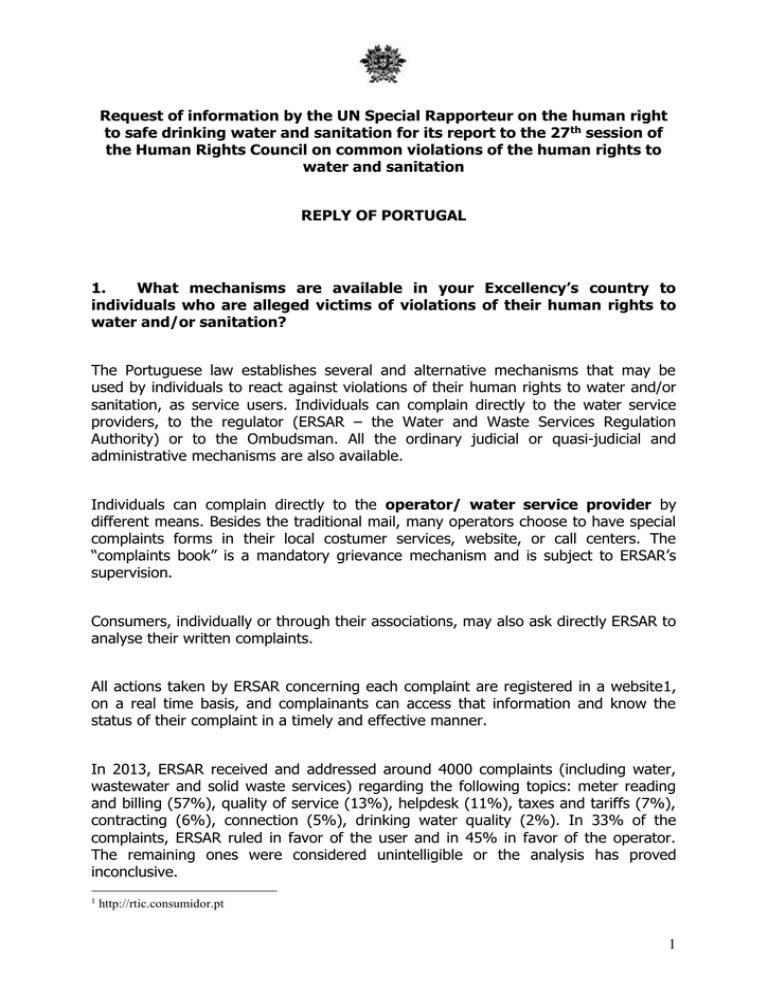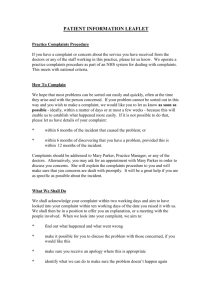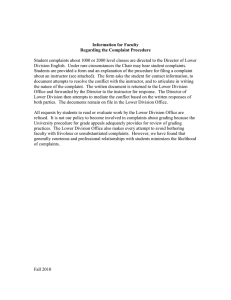Request of information by the UN Special Rapporteur on the... to safe drinking water and sanitation for its report to...
advertisement

Request of information by the UN Special Rapporteur on the human right to safe drinking water and sanitation for its report to the 27th session of the Human Rights Council on common violations of the human rights to water and sanitation REPLY OF PORTUGAL 1. What mechanisms are available in your Excellency’s country to individuals who are alleged victims of violations of their human rights to water and/or sanitation? The Portuguese law establishes several and alternative mechanisms that may be used by individuals to react against violations of their human rights to water and/or sanitation, as service users. Individuals can complain directly to the water service providers, to the regulator (ERSAR – the Water and Waste Services Regulation Authority) or to the Ombudsman. All the ordinary judicial or quasi-judicial and administrative mechanisms are also available. Individuals can complain directly to the operator/ water service provider by different means. Besides the traditional mail, many operators choose to have special complaints forms in their local costumer services, website, or call centers. The “complaints book” is a mandatory grievance mechanism and is subject to ERSAR’s supervision. Consumers, individually or through their associations, may also ask directly ERSAR to analyse their written complaints. All actions taken by ERSAR concerning each complaint are registered in a website1, on a real time basis, and complainants can access that information and know the status of their complaint in a timely and effective manner. In 2013, ERSAR received and addressed around 4000 complaints (including water, wastewater and solid waste services) regarding the following topics: meter reading and billing (57%), quality of service (13%), helpdesk (11%), taxes and tariffs (7%), contracting (6%), connection (5%), drinking water quality (2%). In 33% of the complaints, ERSAR ruled in favor of the user and in 45% in favor of the operator. The remaining ones were considered unintelligible or the analysis has proved inconclusive. 1 http://rtic.consumidor.pt 1 Alternatively, at local level many municipalities have created centers for consumer support that have the responsibility to help consumers clarify and obtain a response to their queries or complaints. Other institutions such as the Ombudsman can also intervene in the complaint handling. According to the latest information, the Ombudsman received the following numbers of complaints from consumers related to water and sanitation issues: 40 in 2011, 43 in 2010, and 56 in 2009, mainly on tariffs and billing. Other complaints that are addressed by the Ombudsman are handled from the perspective of the right to a healthy and ecologically balanced environment: 27 complaints, in 2012, 25 in 2011, and 18 in 2010. These are mainly motivated by charges for the connection to the water and sanitation networks, by conditions in the groundwater capture and, with very little expression, by lack of access to public networks or substitutive services (such as municipal water distribution by tankers or periodic cleaning of septic tanks). Consumer disputes may have an effective final resolution through courts or quasijudicial means, such as arbitration and special non-judicial courts (Julgados de Paz). Considering the types of situations and values generally at stake in these disputes, judicial courts are too costly and most of the times take too long to issue a final decision. Julgados de Paz were created in 2001 to solve small disputes, based on principles of simplicity, adequacy, informality, oral discussion and absolute judicial economy. Parties do not need representation by lawyers and are invited to solve their disputes through mediation. If no agreement is reached in this stage, an informal trial is held, where the judge hears both parties and decides. Consumers associations together with governmental institutions responsible for consumer protection have created arbitration centres especially dedicated to solve consumers’ disputes. The procedure is also very informal and timely and cost-free to the consumers. Since March 2011 arbitration in water and waste disputes is mandatory if requested by the user (Law 6/2011 of 10th. March). There are 6 regional and one national arbitration centre with residual territorial competence. In order to avoid the displacement of users, it videoconference may be used. 2. Have courts adjudicated on any cases related to human rights to water and/or sanitation? If yes, please indicate relevant cases and attach copies of relevant judgments. There have been some courts decisions regarding conflicts between water and sanitation providers and their users, which can be considered relevant to the realization of the human rights to water and sanitation. Most of them relate to situations of lack of payment and the decisions put in evidence that the provision of 2 public essential services (which include water and sanitation) are subject to special rules. In 2004, (Acórdão 685/2004 de 30 de novembro) the Constitutional Court judged a local regulation which established the possibility of the water service provider refusing or interrupting the service provision to all the consumption places owned by anyone that had a debt to the provider, even if the debt was related only to one of those places, to be against the Constitution. The Constitutional Court considered that the access to drinking water is essential to the realization of the rights to health, housing, healthy environment and to an adequate standard of living and that these measures foreseen in the regulation of direct coercion to enforce the payment (that may be valid in other economical transactions) are neither adequate nor proportionate. Consumer arbitration centres have ruled more often in cases related to water and sanitation services. In a decision dated 13th November 2013, the Centro Nacional de Informação e Arbitragem de Conflitos de Consumo (CNIACC) ruled that the burden to prove that the user had been duly notified prior to the interruption of water provision service due to lack of payment was of the water provider. In a decision of 4th July 2013 Julgado de Paz of the city of Porto decided that a service provider could not refuse the provision of the service based on the existence of debts arising from consumptions of a previous occupant of the same place. 5. Does the National Human Rights Institution deal with alleged violations of the human rights to water and/or sanitation? If yes, please indicate relevant cases and attach copies. Yes. The Portuguese Ombudsman (the NHRI) has the legal authority to review complaints regarding the human rights to water and sanitation. During recent years the Ombudsman has received an increasing number of complaints about the tariffs charged by the providers for the connection between the end-user and the drinking water and sewerage networks. Both the water supply and the sanitation services in Portugal have undergone important advances to ensure universal access. Nevertheless, some citizens consider that the tariffs charged by operators for the connections are too high. In some cases, the complainants argue that connections are unnecessary since they have alternative (private) systems. The disparity in water and sanitation tariffs applied to end-users in different municipalities has also led to some complaints. 3 Service providers tend to be fairly tolerant in respect of situations of non-payment, giving the consumers ample delay to pay the services. On the other hand, they settled tariffs for specific social groups. The Ombudsman received ccomplaints from residents regarding the contamination of water resources (and soils) caused by pig farms. Further to numerous contacts between the Portuguese Ombudsman and the licensing and supervisory authorities, pig farms were visited in order to inspect their conditions and to assess their conformity with the applicable rules. Pig farmers have been ordered to legalize their activity and to improve the treatment of pig-rearing effluents, to mitigate the impact of intensive farming on water resources. The activity of some units has been suspended until they ensure proper treatment of the effluent waters. Moreover, the application of the new requirements reduced the environmental impact generated by pig farms in water resources 6. Can people address complaints to service providers, regulators or other mechanisms? How do these processes work? As referred in the answer to the first question, individuals may complaint directly to the provider or also to the regulator or the Ombudsman. If the complaint is presented directly to the provider in written, the provider is obliged to give a written reply within 22 days. Whenever the complaint is written in the complaints book, the provider is also required to give the user a copy of the complaint and send the original to the regulator. Regardless of who sends the complaint to ERSAR (the provider because if the complaint was written in the complaints book, or the user), the regulator hears both parts and considers their arguments to evaluate whether the operator acted correctly or not. The complainant is always informed of the ERSAR’s opinion. If the regulator concludes that there was a violation of the user’s rights, a recommendation is also issued to the operator on how the complaint should be treated by the operator. ERSAR’s opinions and recommendations are, however, not binding and intend to promote a voluntary resolution of the disputes. If any of the parts disagree they should resort to arbitrage by judicial institutions. The regulator informs the complainant about the grievance mechanism at his disposal. ERSAR’s intervention does not replace the use of judicial instances or suspend legal terms established for that purpose. The Ombudsman follows a similar proceeding, often asking for ERSAR’s opinion on the matter. The local centers for consumer support provide information to complainants and also try to promote voluntary resolution of disputes. 4

